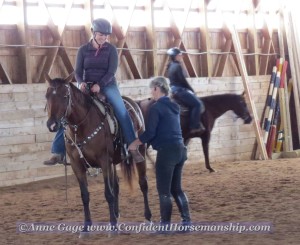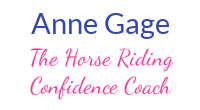Work With The Right Horse Riding Coach
Working with a horse riding coach is an investment in yourself and your horse. If you’re wondering what it costs to hire a riding coach, read my previous post about how much a good riding coach costs.
You may wonder if you even need a riding coach. Will coaching help you or will it be a waste your time and money?
I know there are many benefits to coaching – as a student who has received coaching and as a coach seeing the progress of my clients. One of the biggest reasons for working with a coach is that you don’t know what you don’t know. Something that many of my clients have said after working with me.
Having a riding coach fills in the gaps you don’t realize exist in your own and your horse’s education. When you work with a riding coach, you’ll achieve more with less risk of hurting you, your horse and your partnership.
A good horse riding coach can take your riding to the next level.
Not every coach is a good coach. And not every good coach is the right coach for you. So, how do you find a good riding coach that is best person for you?
Consider these 8 factors when choosing a riding coach.
Instructor or Coach
An instructor generally teaches basic riding skills. A coach expands on those basic skills and goes deeper. She also helps with goal setting, confidence building, sports psychology and competing. Safety and the best interests of you and your horse must be the priority in all riding lessons.
Compatibility
Your horse riding coach can be your mentor, your motivator and your teacher. Her main priority is to help you achieve the goals that you’ve both agreed are appropriate for you and your horse.
You don’t need to be best friends, but you do need to like and respect each other. Your working relationship is productive, positive and based on mutual trust and respect. She’ll tell you what you need to hear. But, without damaging your self-esteem or confidence.
Coaching Style
We don’t all learn well with the same coaching style. So choose a horse riding coach whose style works best for you. Every coach has a predominant style. But a good coach can adjust when necessary to meet their students’ needs.
- Authoritarian “Drill Sargeant”– no nonsense, strict and takes you to boot camp; very structured; expects you to follow his directions & solutions without question
- Casual – relaxed, easy going, not structured but spends a lot of time listening to you; doesn’t push you too hard
- Cooperative – encourages you to have an active role in the lessons & problem solving; flexible in adjusting strategies & techniques to meet your needs
Emotional support
You learn best with a comfortable and positive learning environment. Your coach needs to support you emotionally when you feel frustrated, anxious or disappointed. She’ll celebrate along with you when you’re exhilarated, successful and excited. She’ll motivate and inspire you. You’ll never be made to feel stupid, intimidated or unimportant.
Expectations
A good riding coach will be happy to chat about your goals before you sign up to any training program. Be clear with your prospective coach about your goals and expectations. Listen to her ideas about how you can achieve those goals. Do you like the ideas and direction your prospective coach wants to take?
References/Testimonials
It’s great if someone you know and trust recommends a horse riding coach to you. If you don’t have a personal referral, look for testimonials from current and past clients. What results have their clients’ achieved? Are they similar to what you want to accomplish?
Ask if you can watch the coach working with a current client. That’s a great way to see her coaching style and if she’ll be the right fit for you.
Fees and Availability
You’ll find a wide range of coaching options out there, at a range of prices. What you pay will depend on:
- her expertise
- her qualifications
- the type of lessons you want (group, private or semi private)
- the amount of contact you’ll receive.
Ask a prospective coach what you’ll receive for the money. Is there any contact outside of the scheduled lessons? For example, I provide email and phone support to my clients between their lessons at no additional cost. Some coaches don’t offer this service or charge extra for it.
Find out how many clients the coach has or how many lessons she teaches in a day or week. That will give you an idea of how much time and energy she’s likely to have available for you. It can also affect how flexible she can be with rescheduling lessons if that’s a concern for you.
Education, Experience and Expertise
A good horse riding coach has your and your horse’s well being as her #1 priority. She has the experience, expertise and knowledge to analyse you and your horse. As individuals and as partners.
The best coaches are committed to continuously learning – about horses, riding and coaching. Your coach should be able to explain the how and the why of what she’s teaching you. Being a great rider or horse trainer does not necessarily make someone a good riding coach. They must be able to explain what, why and how they’re doing something – patiently, clearly and in a way you can understand.
Your coach needs to have expertise in the area that you want to improve. Riding a hunter course is very different to riding a cross country course. Even though both disciplines involve jumping.
Look for a horse riding coach with experience coaching riders having similar goals and challenges as you.
Invest your money and time wisely. Take time to find the riding coach best suited to your personal riding needs and goals. Then you and your horse will Enjoy the Ride.
Want to find out more about working with me? Click here to send me an email.

